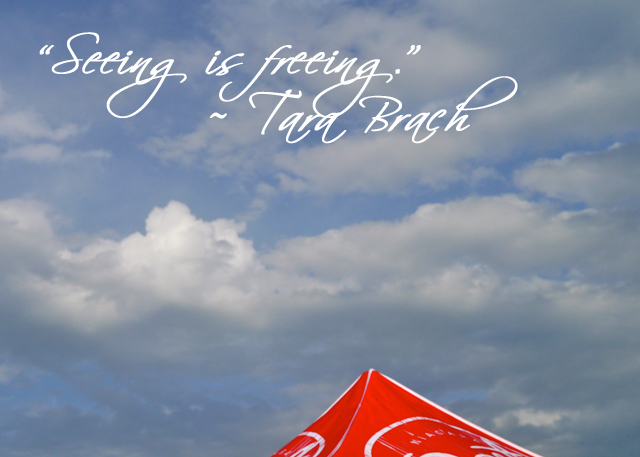Tara Brach begins her podcast on humility with a story about a prisoner in his cell. The prisoner sees an ant and spends some time watching it, engaging with it, giving it crumbs, etc. After some time, he wonders why “it took him 10 long years of solitary confinement to open his eyes to the loveliness of ant.”
What enabled this man to value the ant was not only his attention, but the quality of humility. Once he decided the ant was worthy of his attention, he was not putting himself above or separate. The ant was sharing the cell with him and he was able to appreciate the ant’s qualities.
Humility is one of the nine contemplative habits.
Tara Brach’s one hour podcast on the subject is full of wisdom and I highly recommend listening to the whole thing. Below is a summary of her words, along with some quotes she mentions.
Be humble, for you are made of earth. Be noble, for you are made of stars. ~ Serbian Proverb
The word humility comes from the Latin “humus,” meaning earth or ground. There’s a sense of common ground and equality with all of life.
What Humility is Not
* debasement, false modesty, self-importance, arrogance, superiority, judgment
“It’s important that we learn humility. Modesty is a learned affectation. It’s no good. Humility is great because it says there was someone before me. I’m following in someone’s footsteps. There will be someone after me. We belong to each other. We’re inter-influencing each other all the time. Humility gets that we’re part of something larger.” ~ Maya Angelou
What Humility Is
* honouring our particular talents, recognizing our limitations (the places where we’re conditioned or reactive); lack of self-importance or self-fixation; able to see the good in ourselves and others; surrendering the small, egoic identity (importance, pride) to realize our sacred connection
But those talents and limitations are like ripples or waves on the ocean. We know the depth of who we really are. It arises out of this wise view – a deep wisdom understanding of interdependence. Everything we do, perceive, experience is related to everything else in the world. You cannot take yourself apart from things. ~ Tara Brach
Brach says that, according to the Talmud, the words of the Torah (or spiritual wisdom) only survive in those whose minds are humble. Humility is essential for spiritual progress or the attainment of wisdom.
Wisdom is knowing I am nothing, Love is knowing I am everything, and between the two my life moves. ~ Nisargadatta Maharaj
Deflation and Inflation
It’s quite natural as we evolve that we feel a sense of separateness (ego) and that this leads to deflation and inflation. We bounce back and forth. But, self-importance (or self-fixation or separateness) blocks seeing the world as it is; it blocks wisdom and goodness.
Deflation (feeling bad about ourselves) comes from a strand of truth. We want to feel a sense of belonging, which makes us vulnerable. We’re conditioned, we have fears, we get angry and reactive, we cause harm. We’re far from perfect.
Brach describes deflation (and inflation) as delusions – owning the experience. They both make us feel separation. With deflation, we feel shame, or that we’re not good enough, or undeserving.
Inflation (feeling we’re special) also has a strand of truth. We come from the stars. We’re consciously aware. We sense our radiance and luminosity and feel very special and awesome.
Inflation makes us feel superior to others (and all of nature). It’s expression is arrogance, entitlement, pride, and we cling to this too, because it protects us from feeling empty.
Again, the delusion is owning the experience, because this radiance comes from the earth, through us. It doesn’t belong to us.
Inflation is present when there is stereotyping, labelling, judging – as good/bad, better/worse, smart/dumb, right/wrong, etc.
With our continued evolution, however, we move towards a sense of belonging and oneness and interdependence.
Humility is shedding any feeling of superiority or inferiority.
Humility is about moving towards that place of belonging, not separateness – a place where everyone and everything has a part to play, where nothing is better or worse than anything else.
Noticing our own episodes of deflation and inflation starts to recondition the patterns. Brach says that “seeing is freeing.”
Similarly, in photography Art Wolfe says that he “shoots without prejudice,” meaning that everything is a possible (and worthy) subject for his lens. I can totally relate to this. Seeing everything as worthy has greatly expanded my photography repertoire. I see much more beauty than I ever did previously.
What does humility mean to you?

Interesting to read about inflation and deflation and how to find humility between the two, on neutral ground in a state of balance. I loved the story of the ant.
This is just beautiful: “Wisdom is knowing I am nothing, Love is knowing I am everything, and between the two my life moves.” ~ Nisargadatta Maharaj
Thank you. This is a beautiful post. With your permission I want to post it in my Face-Book.
Certainly, Heng.